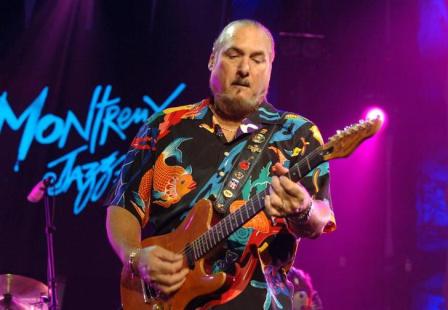Steve Cropper (pictured above at the Montreux Jazz Festival in 2005) usually comes near the top of “greatest guitarist” lists compiled by music magazines and aficionados. Jimi Hendrix, of course, reigns supreme, while Cropper jockeys for position with maybe Eric Clapton or Jeff Beck. But it’s rarefied air up there, and Cropper stands out from the pack as a low-key sideman who prefers subtle rhythm guitar licks over flashy solos.
Cropper was the primary guitarist and one of the chief producers at Stax Records, the Memphis-based soul label that begat Otis Redding, Carla Thomas, and Sam and Dave. Fifty years ago, the core members of the Stax studio band started working up instrumental jams during snatches of spare time between recording sessions, and label executives decided the tunes were worthy of release. And that’s how Booker T. and the MG’s became the biggest instrumental band in the world with breezy hits such as Green Onions and Soul Limbo
.
 As Stax’s studio chief, Cropper co-wrote hundreds of songs, including Redding’s posthumous chart-topper (Sittin’ On) The Dock Of The Bay.
As Stax’s studio chief, Cropper co-wrote hundreds of songs, including Redding’s posthumous chart-topper (Sittin’ On) The Dock Of The Bay. Cropper also collaborated with Wilson Pickett (pictured with Bruce Springsteen in 1999) on In The Midnight Hour
and Eddie Floyd on Knock On Wood
. He reached a mainstream audience once again in 1980 with The Blues Brothers
movie, where he played a member of the band reunited by Dan Aykroyd’s and John Belushi’s characters.
I first met Cropper in 1994 just before the release of That’s the Way It Should Be, the first album from Booker T. & the MG’s in 17 years, and the group’s last to date. The beefy, bearded and pony-tailed guitarist was the stereotypical charming southern gentleman, regaling me with stories from the Stax days. But he didn’t pull his punches when I asked him about Pickett’s claim (in Gerri Hirshey’s Nowhere To Run: The Story Of Soul Music
) that he alone wrote “In the Midnight Hour.” After the interview was over, he told me he would “kick his ass” next time he saw Pickett. (I’m not sure if he got around to that before Pickett died in 2006.)
I read once that Wilson Pickett said you shouldn’t have been credited for “Midnight Hour”?
He’s said that more than once. He’s completely crazy. He would never tell me that to my face. He respects me and loves me dearly and I don’t understand where that comes from. That was my idea. That was definitely not his idea. He came in with a song called “Don’t Fight It” and I brought him “Midnight Hour” and then the two of us collaborated on “I’m Not Tired.” We wrote three songs the same night. (Stax co-owner) Jim Stewart and (executive/producer) Jerry Wexler were around when all that went down. That’s absolute bullshit that I shouldn’t get credited for it. What can I say? He did not write that music. He had nothing to do with writing that music. That’s absolute crap. I can’t believe that he’s telling people this, you know?
It’s more your song than his, in some ways?
Certainly. But that’s not the first time. (Atlantic Records engineer) Tommy Dowd called me one time and said, ‘Have you seen the last issue of Playboy?‘ Or one of those magazines. Somebody made a statement in there that I shouldn’t have been on “(Sittin’ on) The Dock of the Bay.” And I’m going, “Where in the hell did this come from?” I wrote all the lyrics and the bridge and did all the arrangement. The only thing I didn’t write was the intro and the first verse. It’s pretty amazing: he writes over three-quarters of a song and somebody says his name shouldn’t have been on there.
###
NOTE: This is an edited excerpt from my gossipy rock bio Strange Days: The Adventures of a Grumpy Rock ‘n’ Roll Journalist in Los Angeles, available here. For more info, go to strangedaysbook.com
Copyright © 1994, 2013 by Dean Goodman. PLEASE DO NOT CUT AND PASTE THE WHOLE THING
